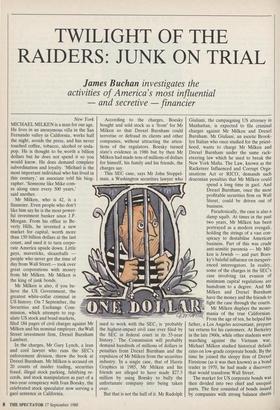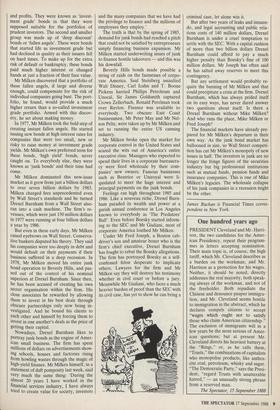TWILIGHT OF THE RAIDERS: JUNK ON TRIAL
activities of America's most influential — and secretive — financier
New York MICHAEL MILKEN is a man for our age. He lives in an anonymous villa in the San Fernando valley in California, works half the night, avoids the press, and has never touched coffee, tobacco, alcohol or soda- pop. He is thought to be , worth a billion dollars but he does not spend it so you would know. He does demand complete subordination and loyalty. 'Michael is the most important individual who has lived in this century,' an associate told his biog- rapher. 'Someone like Mike com- es along once every 500 years,' said another.
Mr Milken, who is 42, is a financier. Even people who don't like him say he is the most power- ful investment banker since J.P. Morgan. From his office in Be- verly Hills, he invented a new market for capital, worth more than 150 billion dollars at the last count, and used it to turn corpo- rate America upside down. Little guys, mavericks, sleazeballs people who never got the time of day from Wall Street — took over great corporations with money from Mr Milken. Mr Milken is the king of junk bonds.
Mr Milken is also, if you be- lieve the US Government, the greatest white-collar criminal in US history. On 7 September, the Securities and Exchange Com- mission, which attempts to reg- ulate US stock and bond markets, filed 184 pages of civil charges against Mr Milken and his nominal employer, the Wall Street investment firm, Drexel Burnham Lambert.
In the charges, Mr Gary Lynch, a lean and cool lawyer who runs the SEC's enforcement division, threw the book at Drexel Burnham. Mr Milken is accused on 20 counts of insider trading, securities fraud, illegal stock parking, falsifying re- cords, and stock manipulation as part of a two-year conspiracy with Ivan Boesky, the celebrated stock speculator now serving a gaol sentence in California. According to the charges, Boesky bought and sold stock as a 'front' for Mr Milken so that Drexel Burnham could terrorise or defraud its clients and other companies, without attracting the atten- tions of the regulators. Boesky turned state's evidence in 1986 but by then Mr Milken had made tens of millions of dollars for himself, his family and his friends, the charges say.
This SEC case, says Mr John Stoppel- man, a Washington securities lawyer who
used to work with the SEC, is 'probably the highest-impact civil case ever filed by the SEC in federal court in its 55-year history.' The Commission will probably demand hundreds of millions of dollars in penalties from Drexel Burnham and the expulsion of Mr Milken from the securities industry. In a single case, that of Harris Graphics in 1985, Mr Milken and his friends are alleged to have made $27.5 million by using Boesky to bully the unfortunate company into being taken over.
But that is not the half of it. Mr Rudolph
Giuliani, the campaigning US attorney in Manhattan, is expected to file criminal charges against Mr Milken and Drexel Burnham. Mr Giuliani, an ascetic Brook- lyn Italian who once studied for the priest- hood, wants to charge Mr Milken and Drexel Burnham under the same rack- eteering law which he used to break the New York Mafia. The Law, known as the Racketeer Influenced and Corrupt Orga- nisations Act or RICO, demands such draconian penalties that Mr Milken could spend a long time in gaol. And Drexel Burnham, once the most profitable securities firm on Wall Street, could be driven out of business.
Paradoxically, the case is also a damp squib. At times in the past two years, Mr Milken has been portrayed as a modern svengali, holding the strings of a vast con- spiracy to destabilise American business. Part of this was crude anti-semitic paranoia — Mr Mil- ken is Jewish — and part Boes- ky's baleful influence on inexperi- enced interrogators. In reality, some of the charges in the SEC's case involving tax evasion of minimum capital regulations are humdrum to a degree. And Mr Milken and Drexel Burnham have the money and the friends to fight the case through the courts.
Mr Milken displays the mono- mania of the true Californian. From the age of ten, he helped his father, a Los Angeles accountant, prepare tax returns for his customers. At Berkeley in the late 1960s, while other students were marching against the Vietnam war, Michael Milken studied historical default rates on low-grade corporate bonds. By the time he joined the sleepy firm of Drexel Firestone (as it was then known) as a bond trader in 1970, he had made a discovery that would transform Wall Street.
The market for US corporate bonds was then divided into two chief and unequal parts. The first consisted of bonds issued by companies with strong balance sheets and profits. They were known as 'invest- ment grade' bonds in that they were supposed suitable for the portfolios of prudent investors. The second and smaller group was made up of 'deep discount' bonds or 'fallen angels'. These were bonds that started life as investment grade but had declined in quality as their issuers fell on hard times. To make up for the extra risk of default or bankruptcy, these bonds paid much higher interest or changed hands at just a fraction of their face value.
Mr Milken discovered that a portfolio of these fallen angels, if large and diverse enough, could compensate for the risk of individual companies going bust. The port- folio, he found, would provide a much higher return than a so-called investment grade portfolio. Armed with this discov- ery, he set about making money.
In 1977, Mr Milken took the bold step of creating instant fallen angels. He started issuing new bonds at high interest rates for companies that were too small, new or risky to raise money at investment grade yields. Mr Milken's own preferred term for these bonds, 'high yield' bonds, never caught on. To everybody else, they were known as 'junk bonds' and .their time had come.
Mr Milken dominated this new-issue market as it grew from just a billion dollars to over seven billion dollars by 1983. Milken charged fees unprecedented even by Wall Street's standards and he turned Drexel Burnham from a Wall Street also- ran into a cash machine. The firm's re- venues, which were just 150 million dollars in 1977 were running at four billion dollars a year by 1986.
But even in these early days, Mr Milken raised eyebrows on Wall Street. Conserva- tive bankers disputed his theory. They said his companies were too deeply in debt and would default on their payments if their business suffered in a deep recession. In 1978, Mr Milken moved his entire junk bond operation to Beverly Hills, and pas- sed out of the control of his nominal superiors at Drexel Burnham. Since then, he has been accused of creating his own secret organisation within the firm. His close associates he rewarded by allowing them to invest in his best deals through obscure partnerships only now being in- vestigated. And he bound his clients to each other and himself by forcing them to invest in one another's deals as the price of getting their capital.
Nowadays, Drexel Burnham likes to Portray junk bonds as the engine of Amer- ican small business. The firm has spent millions of dollars on advertisements show- ing schools, houses and factories rising from howling wastes through the magic of high-yield finance. Mr Milken himself, in a statement of daft pomposity last week, said very much the same thing: 'During the almost 20 years I have worked in the financial services industry, I have always tried to create value for society, investors and the many companies that we have had the privilege to finance and the millions of employees they employ.'
The truth is that by the spring of 1985, demand for junk bonds had reached a pitch that could not be satisfied by entrepreneurs simply financing business expansion. Mr Milken started underwriting issues of junk to finance hostile takeovers — and this was his downfall.
Beverly Hills bonds made possible a string of raids on the fastnesses of corpo- rate America. Saul Steinberg assaulted Walt Disney, Carl Icahn and T. Boone Pickens harried Phillips Petroleum and Unocal, Sir James Goldsmith captured Crown Zellerbach, Ronald Perelman took over Revlon. Finance was available to everybody. Two obscure East Coast businessmen, Mr Peter May and Mr Nel- son Peitz, were taken up by Mr Milken and set to running the . entire US canning industry.
Mr Milken broke open the market for corporate control in the United States and scared the wits out of America's entire executive class. Managers who expected to spend their lives in a corporate bureaucra- cy were fired wholesale by their com- panies' new owners. Famous businesses such as Beatrice or Uniroyal were li- quidated to meet the huge interest and principal payments on the junk bonds.
Feelings ran high throughout 1985 and 1986. Like a nouveau riche, Drexel Burn- ham paraded its wealth and power at a garish annual conference in Los Angeles known to everybody as 'The Predators' Ball'. Even before Boesky started inform- ing to the SEC and Mr Giuliani, most of corporate America loathed Mr Milken.
Under Mr Fred Joseph, a Boston cab- driver's son and amateur boxer who is the firm's chief executive, Drexel Burnham has fought to rebut the Boesky allegations. The firm has portrayed Boesky as a self- confessed felon desperate to implicate others. Lawyers for the firm and Mr Milken say they will destroy his testimony whether in civil court or before a jury. Meanwhile Mr Giuliani, who faces a much heavier burden of proof than the SEC with its civil case, has yet to show he can bring a criminal case, let alone win it.
But after two years of leaks and innuen- do, and legal accounting and public rela- tions costs of 140 million dollars, Drexel Burnham is under a cruel temptation to settle with the SEC. With a capital cushion of more than two billion dollars Drexel Burnham could afford to pay a much higher penalty than Boesky's fine of 100 million dollars. Mr Joseph has often said he has salted away reserves to meet this contingency.
But any settlement would probably re- quire the banning of Mr Milken and that could precipitate a crisis at the firm. Drexel Burnham, which has always prided itself on its easy ways, has never dared answer two questions about itself. Is there a Drexel Burnham without Mike Milken? And who runs the place, Mike Milken or Fred Joseph?
The financial markets have already pre- pared for Mr Milken's departure in their own way. As the junk bond market has ballooned in size, so Wall Street competi- tion has cut Mr Milken's monopoly of new issues in half. The investors in junk are no longer the fringe figures of the securities industry but big professional institutions such as mutual funds, pension funds and insurance companies. This is one of Mike Milken's legacies. The wholesale collapse of his junk companies in a recession might be the other.
James Buchan is Financial Times corres- pondent in New York.



































































 Previous page
Previous page